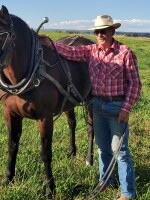The fires on Maui have been a top news story for the past two weeks. While origin of the fires are still in question, the 2016 closure of Hawaii Commercial & Sugar Company, which was the island’s last sugarcane plantation, may have been a factor. Much of the land used to grow sugarcane had been left fallow for several years and had been overtaken by invasive grasses. As residents of the U.S. Great Plains can attest, grass fires are often deadly for livestock and humans, because those fires can travel across the country at 15 miles per hour, depending on wind speeds.
Proposition 12 is a California law that sets confinement standards for pigs and poultry both in the state, and for products from those animals that were raised elsewhere and are sold in California. The National Pork Producers Council is supporting a bill introduced by Kansas Senator Roger Marshall that would prohibit states from regulating agriculture outside of their border, and he’s pushing to get the bill incorporated into the 2023 Farm Bill. But two animal rights groups, the Center for a Humane Economy and Animal Wellness Action, point out that the bill would nullify hundreds of state consumer and farmers protection laws. According to a Purdue University survey, there is not an outpouring of support for this bill.
Pigs have been an important enterprise on farms in the U.S. for a couple of hundred years. Decades ago, pigs were called mortgage lifters, because they were a profitable enterprise on most family farms. The sows were often housed in small, individual buildings on pastures, where sows gave birth to their piglets, that were then weaned at about eight weeks of age and moved to an area where they were fed grain rations that would help them to grow to a market weighs of 225 to 250 pounds. During the late 1950s and 1960s, confinement barns became popular, and sows were housed inside, where they gave birth to their piglets, and remained to be bred again. Farrowing, or gestation crates, that were about 3 feet wide and 6 feet long were the next development, which reduced the number of piglets that were injured or killed by the sow laying down on them. But animal advocates believe that these crates are inhumane and continue to push for legislation that would ban their use in pork production across the country, much like Proposition 12 does in California.
Although The U.S. House of Representatives has been working on the 2023 Farm Bill for over a year, House Ag Committee chairman Glenn Thompson is proposing that Congressional leaders should pass legislation to extend the current Farm Bill, which will expire September 30th. Neither the Senate nor the House has produced a draft of the bill for consideration, so they have a lot of work to do on the Farm Bill before the September 30th deadline.
According to a CoBank report, after peaking in 2020, sales of plant-based meat alternatives are slipping, and a Purdue University survey with 1,200 consumers in June, found that by far, consumers felt that beef from cattle was superior to the alternatives. The survey determined that while consumers remain interested in the concept of plant-based meats, they have concerns about the highly processed products and high prices associated with these alternatives.
Author Robert Louis Stevenson wrote: “Sooner or later everyone sits down to a banquet of consequences.”



